How to vacation when you farm
If you think because you have livestock and a garden, you are stuck at home, then this article is the help you need. Learn how to vacation when you farm and enjoy time away to get the reset you just might be looking for.
Bookmark this article because these homesteading tips are good ones to refer back to every summer!
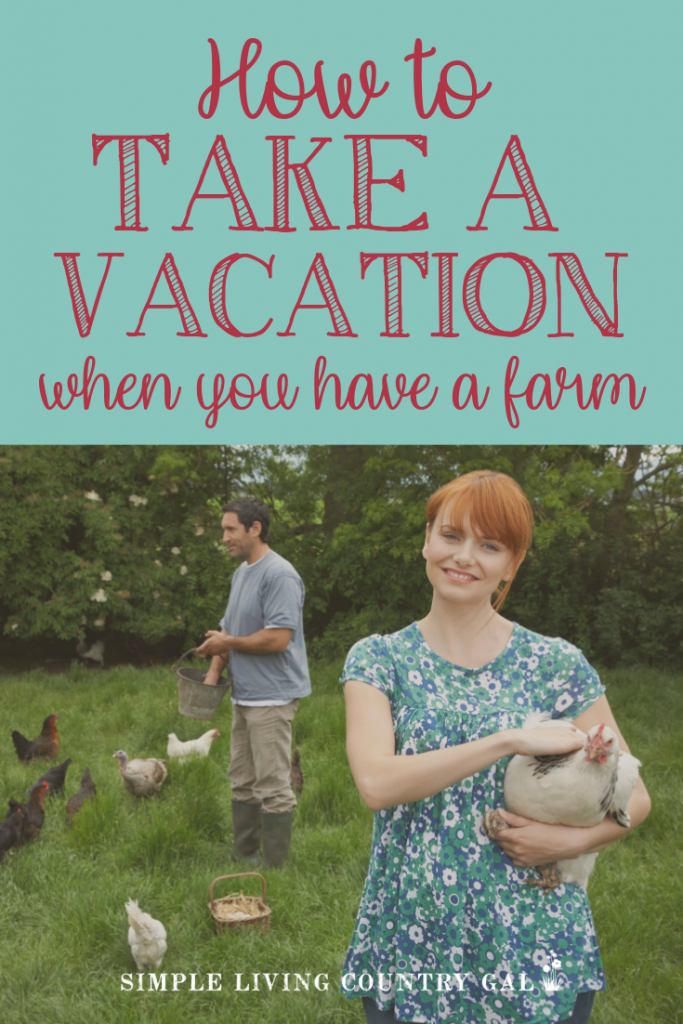
The first thing I tell folks when they are considering starting a homestead is, to be prepared to be home….a lot.
That is the truth of it right there.
Whether you have just a few animals on your homestead or a full-time farming operation, leaving for trips or getaways is not easy. Once you add living and breathing creatures to your homestead, ones that depend on you specifically for their care, it is critical that you are there to do just that.
Every ….Single….Day.
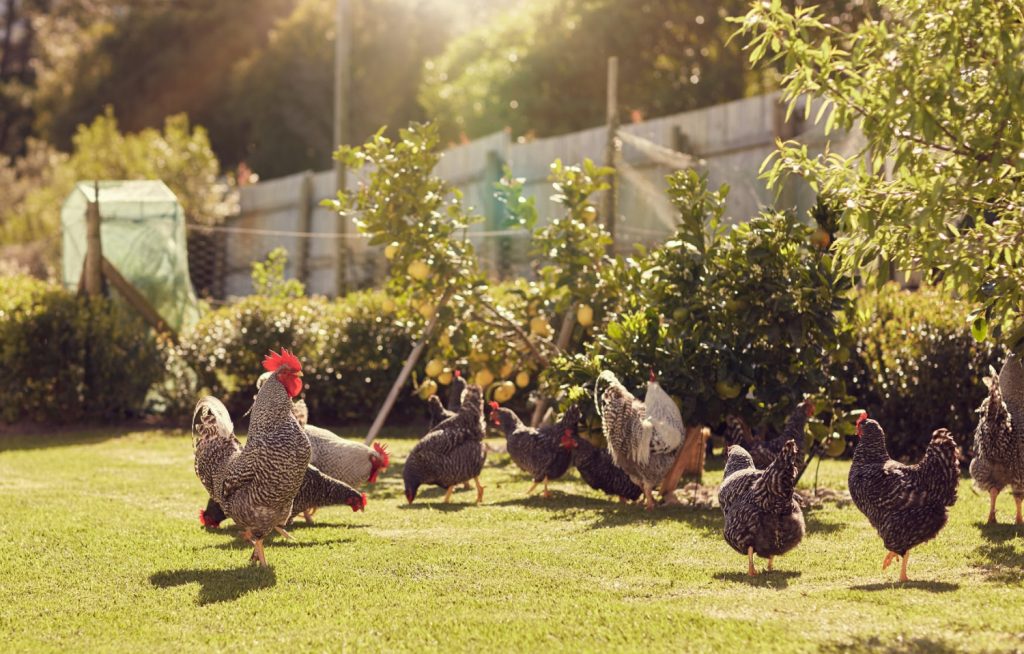
Look at me, for example. I have been homesteading for just over 13 years, and in the beginning, I rarely left town or traveled. My days and nights were scheduled by feedings and milking, and that kept my travel options pretty limited.
Even family gatherings were set by my feeding schedule. And when you milk animals, it is even more necessary that your barn schedule is strictly adhered to. Get a peek at our homesteading daily schedule to get an idea of what is involved.
Since my family has a history of farming in our genes, I was ready and prepared for this. Unfortunately, not everyone that begins a homestead fully grasps the reality that comes with it, and before they know it, they realize they are tied to their homes in a way they were not prepared for.
And (sometimes) just like that, the fun is taken out of their new life of farming.
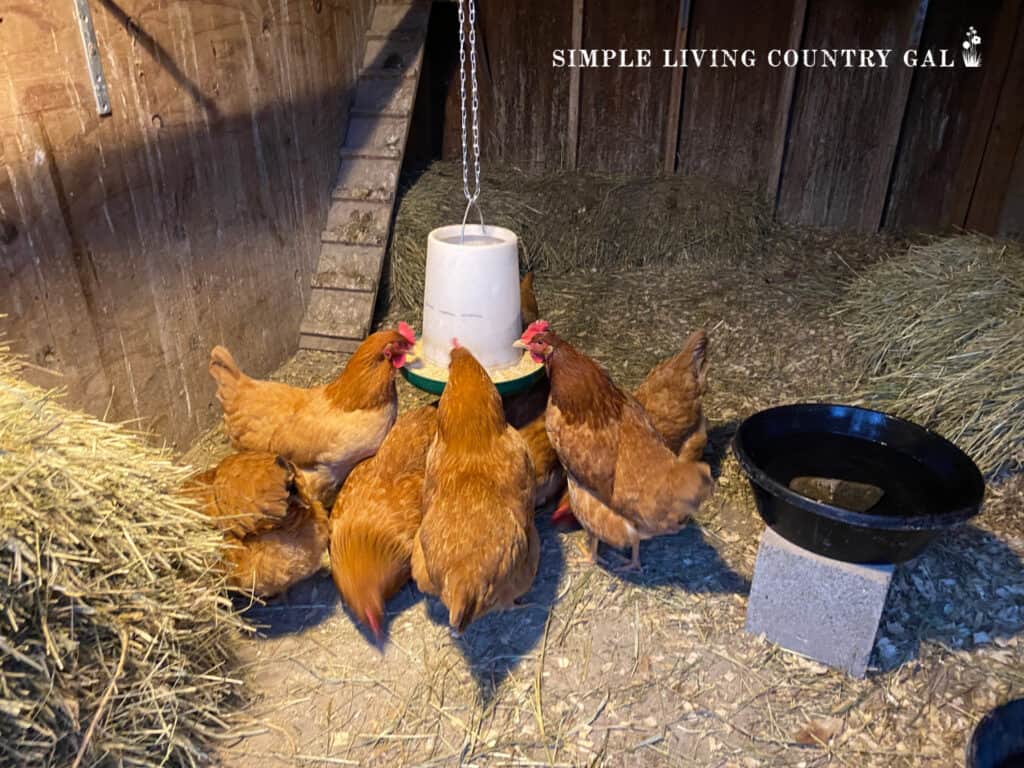
But luckily, it doesn’t have to be that way. All or nothing does not need to be your reality when choosing to take a vacation or do a staycation.
Is it possible to travel with a homestead?
The answer is easy, you can borrow or even hire help to take care of things when you need a break or want to get away to recoup. Dependable, reliable, good solid help that will allow you to catch your breath and recharge your batteries just a bit.
Homesteading can be a bit demanding, and even though most realize it will be hard, the rewards far outweigh the work, and that is why we all do this. Day in and day out with a smile on our faces.
Yet, a break to get away sure would be nice.
How to Vacation When You Farm
Bringing in temporary help is a great way to ensure your homestead will be taken care of while you are away. There are a few ways to find fill-in help for a short time, and later, we will talk about finding regular help along with tips on how to hire.
Borrow Help
If you just want help when you travel then borrowing help may be the best way to go. This is a common way for farmers to vacation and a great way to homestead without being permanently tied to their homes year-round.
Look for someone you trust
Before I acquired regular help on our homestead, I would always turn to a family member, one of my kids when we traveled. But before they were old enough, I asked a close neighbor who also had a small farm.
This is important to remember when looking for someone you can rely on. If they have a homestead of their own, then you know they fully understand what you need from them, meaning you can trust them.
By trust, I am not just talking about their responsibility level but their experience level as well. If you have a garden that needs to be watered while you are away, you may want to ask someone with a garden as well.
This way, you know they understand the importance of routine watering, whereas someone with no gardening experience may not.
The same is true if you have a small flock of chickens that need to be looked after. Ask a neighbor or friend who has chickens themselves to look after your flock. Again, the reason is to lean on their experience in knowing the importance of being on time when caring for living and breathing things.
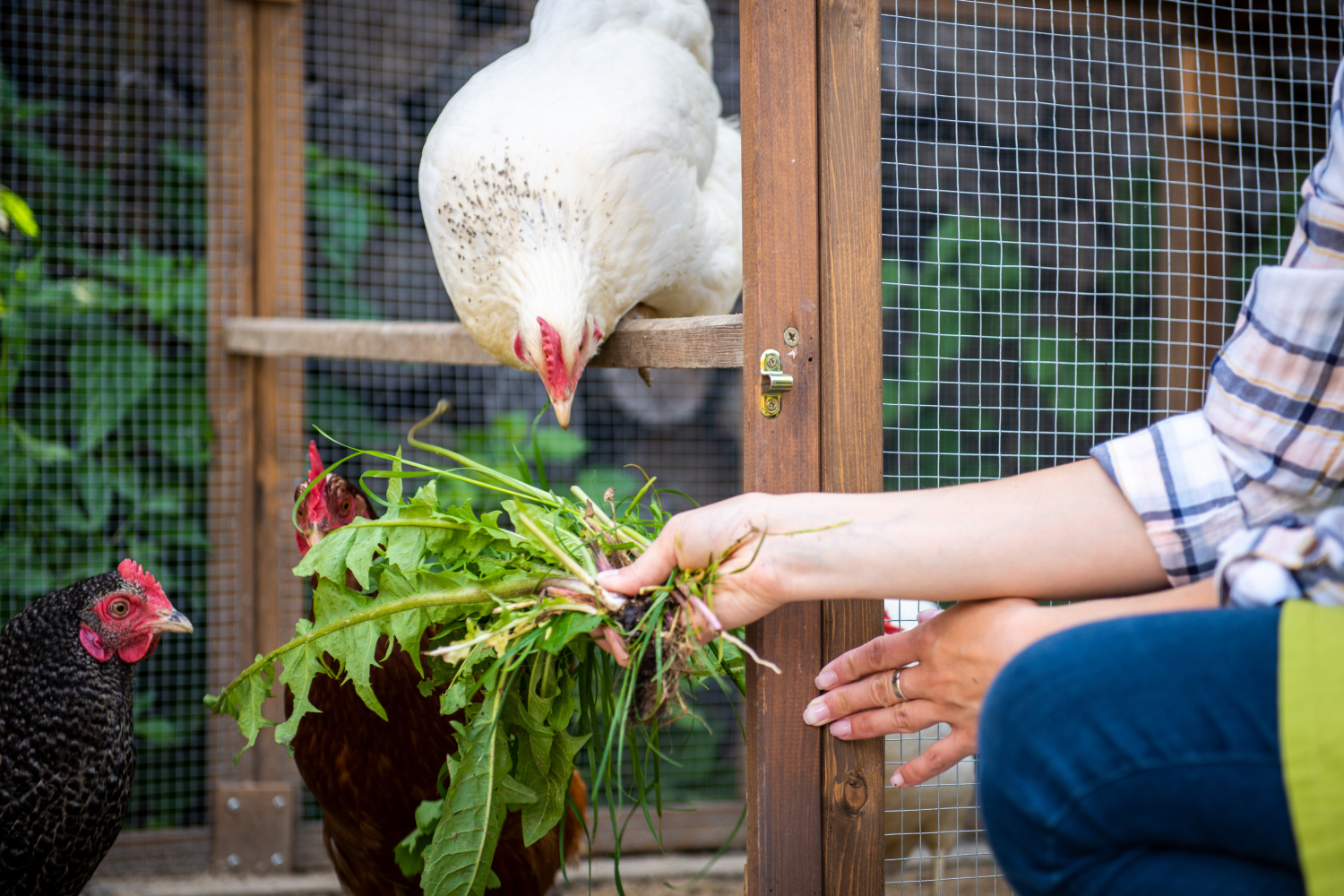
Inspect Shelters
The biggest tip I can give is before you vacation with a farm is to walk through your setup and make any updates or repairs if needed. The more efficient your setup is, the easier it will be to care for your animals.
Go through and make sure all of your animal housing is secure and easy to access. This includes your barn, coop, pens, or other areas where you house your animals.
Your goal is to ensure that each shelter is doing its job—housing your animals appropriately, keeping rodents out, and being easy to maintain. The sooner you can find any openings and close them up, the quicker you can put a stop to any potential problems.
Once a rodent finds a way in, it will come and go as it pleases.
Rodents include big predators like raccoons and weasels all the way to small rodents such as mice or rats that can get in and wreak havoc on your feed, eggs, and even your livestock.
SLCG Pro Tip: I like to do an outbuilding walkthrough each month on our homestead. This is my chance to check for any cracks, holes, or other openings. If it is small, I can usually fix it myself; for any larger issues, I can put it on my Hubby’s list to take care of.
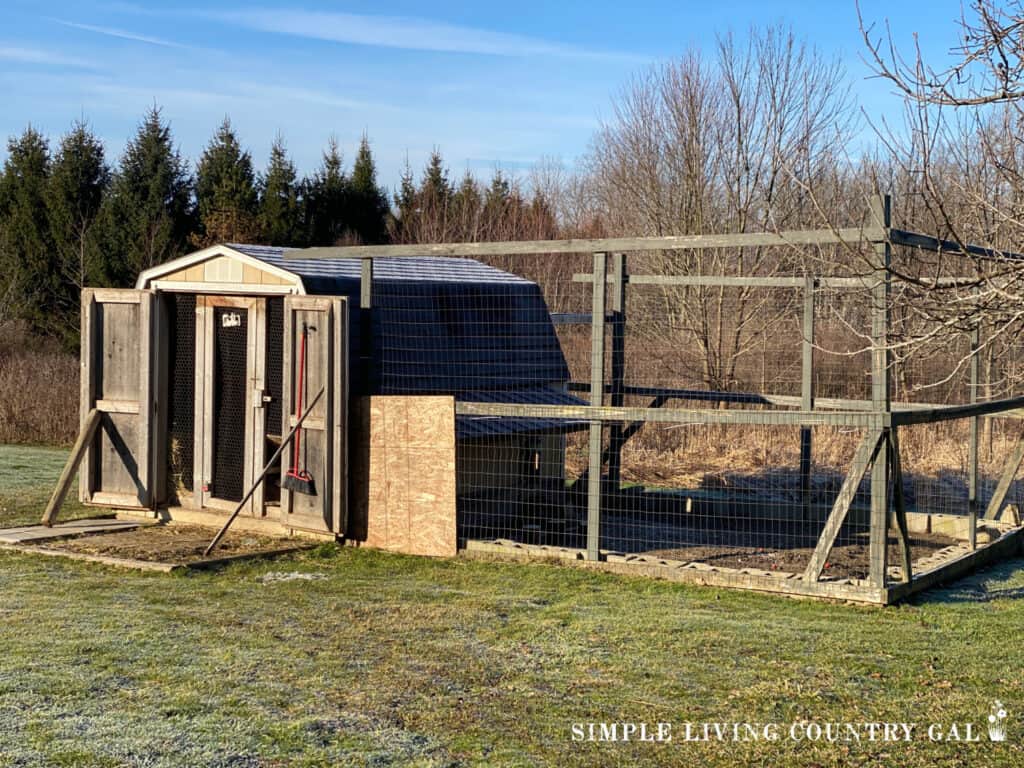
When inspecting a shelter, always look at it from every angle. Get down low, look up high, and get in close. You might be surprised at what a weasel can squeeze through if it’s determined, so don’t overlook the small spaces and cracks.
If you have a chicken coop, be sure to take a look at the outside run area.
Not many chicken owners worry much about the run, but that can be a huge mistake. A chicken run is not just there to keep your chickens in, but it is also there to keep predators out. Build a chicken run so it is effective depending on where you live and the animals that frequent your area.
For us, hawks are a huge issue, and for that reason, we have a small roof that is on the side of our shed to give a bit of overhead protection. This will allow our hens to be out yet covered and masked a bit from the sky.
By always being on top of your buildings and structures, you can stay one step ahead of any potential problems. This will make it easier for outside help to step in when needed.
Pare down the to-do list
When asking for vacation help, keep your chore list minimal. Remember, you are getting free help here, so maybe leave “Clean out the horse stalls daily” off of the to-do list. I would instead stick to the basics and lower your expectations.
A good list of basic care could be:
- Give daily fresh and clean water
- Feed animals
- Give a fresh batch of hay
- Collect eggs
- Water garden
Emphasize clean water to your help.
Be sure to tell your temporary help to give fresh, clean water every single day. If the water bucket is full, dump it out and refill it. Fresh water is important and the easiest way to keep your animals healthy.
Next up is food. Be sure to be incredibly specific on what will be fed, to whom, and when. Label feed bowls, post instructions where the feed is kept, be specific on times, and so on. The more specific you are, the easier it will be for your helper.
If you have animals that eat hay, be sure to instruct how much hay to give and how often to give it.
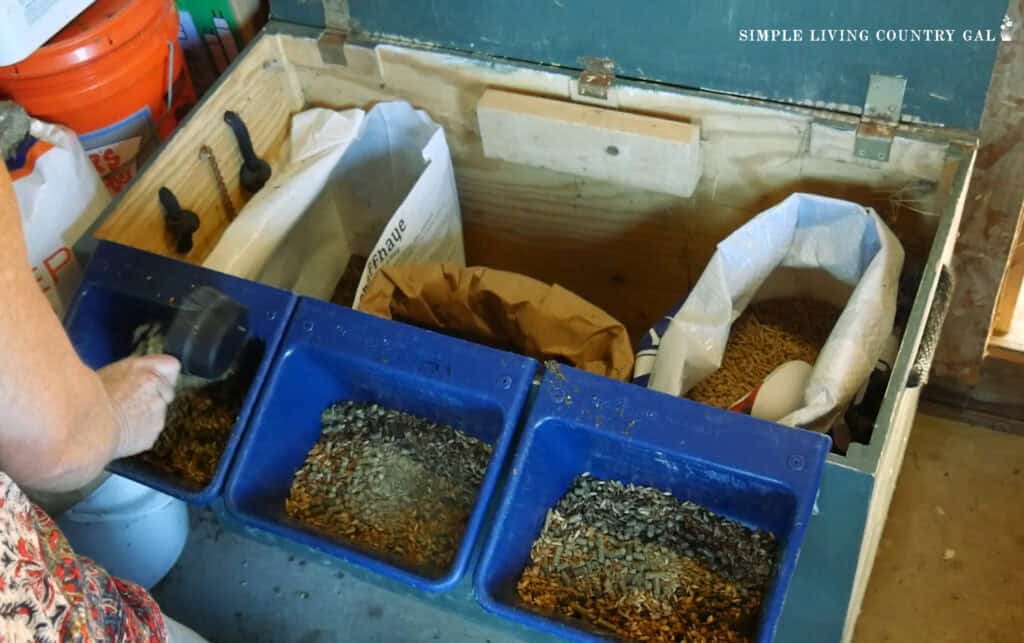
let’s talk about safety.
If your animals are free to roam during the day yet need to be locked up at night, tell your vacation help your routine and why you do this. When they understand that locking up your livestock at night is for safety reasons, they will also understand the risks if they forget to do this.
Explain if you have hawks, coons, coyotes, etc. Those nocturnal predators can destroy a flock of hens in one night if left out in the open.
SLCG PRO TIP: Consider using a predator deterrent light around your chicken coop and run. This will help to scare away a majority of animals that can harm not only your setup but your flock as well.
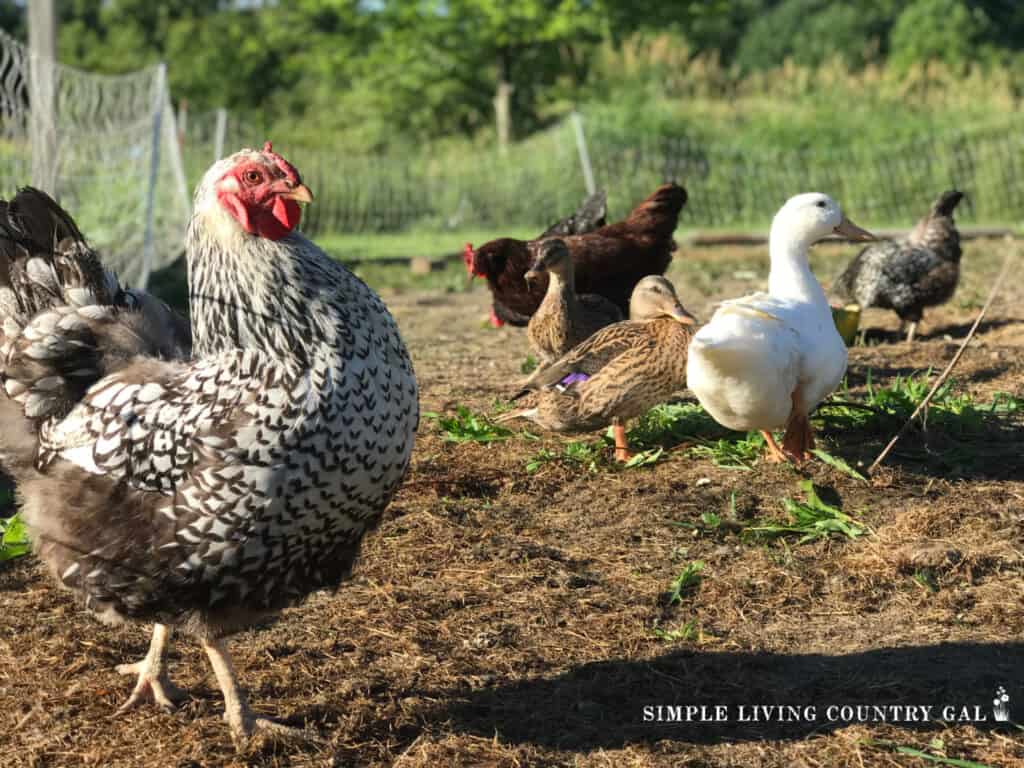
Step #3. Be specific about what you need.
Be specific when explaining what needs to be done so you can vacation when you farm without stressing out about the care being given back at home.
Tell your volunteer WHY you do what you do. When they know why, they will understand the importance of what you do, and they will be less likely to skip over a chore.
Step #4. How to say thank you.
I know this might sound silly, but knowing how you plan to thank your volunteer is good to have in the back of your mind.
Here are a few ideas:
- A souvenir from the place you are vacationing at.
- A gift basket or a gift card.
- Reciprocate the help for an upcoming trip they will be taking.
- Invite them over for dinner after you return.
- Allow them to take any milk, eggs, or produce from your garden while they are filling in.
Whatever you decide, be sure to do something so they know how much you appreciate them. This will make it easier to ask them again in the future and easier for them to say yes!
SLCG PRO TIP: If you need help watching over your chickens, why not give your help access to all the eggs they collect as a thank you? This is a great way to compensate while giving them one of the joys of homesteading as a thank you.
HIRING REGULAR HELP FOR YOUR HOMESTEAD
If you are looking for routine assistance, you may want to consider hiring regular help. This is not only beneficial for you but also a great way to help someone who is looking to make a little extra money.
Help can include daily, weekly, or as you have a big project that you need assistance with.
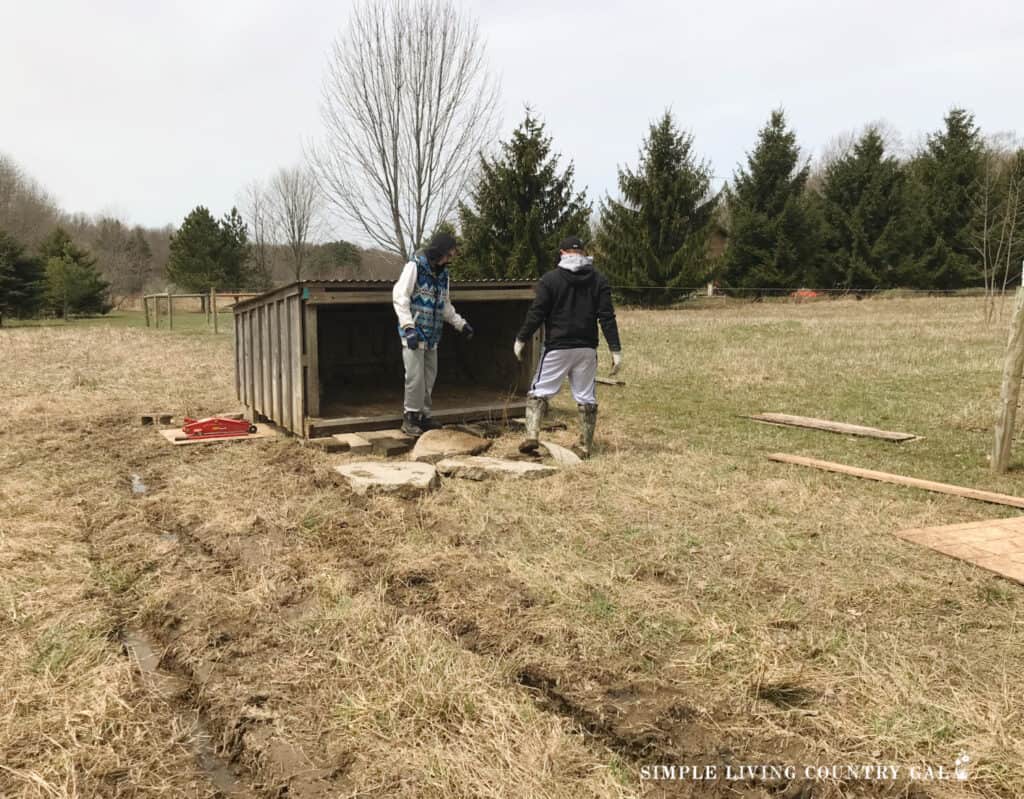
STEP # 1. KNOW JUST WHAT YOU ARE LOOKING FOR.
By knowing just what you need before you go looking for it, you will be better prepared to decide.
- Is this going to be regular help or seasonal?
- Will you need someone each week or only when you travel?
- Will you pay for your help or barter/trade?
When I first started with animals on our homestead, I loved the work, but as I get older, I am finding the work is hard on me physically. To help, I now have a neighbor gal who comes to our home a few days a week and takes care of the chores.
This was probably the best decision I ever made. As I get older, I am finding that my back no longer wants to do all the hard and heavy lifting. Bringing outside help allows me to enjoy a homesteading lifestyle without having to work all the time.
Another bonus of having help is freeing up time to do other things, such as eating out at a restaurant, sleeping in, or just reading a book on the porch.
This break during the week has helped me grow as a farmer by giving me extra time and energy to add new projects and experiment with new animals.
The Backyard Homestead Seasonal Planner: What to Do & When to Do It in the Garden, Orchard, Barn, Pasture & Equipment Shed




STEP #2. HOW OFTEN DO YOU NEED HELP?
Like I said above, I love having weekly help, but it didn’t start out that way. We began with just a day here and there and worked up to a more routine schedule.
You can start out with just 1-2 evenings a week or just a few days a month when you need to go out of town. Then, you can increase the frequency as you and your animals become comfortable with your help.
By starting out small, you can see if the helper will fit in with not only your animals but with you as well.
Personality is key, and before you have your new help work every single day, it is better to be sure things are a good match before committing. You want to be sure they like your livestock, have a good temperament, and that your livestock is comfortable with them being around.
Step #3. Be specific about what you need and how you will compensate.
Tell your help from the beginning exactly what you need them to do and how often you need them to do it. The more specific you are from day one, the less room there is for misunderstanding.
Go one step further and write it all down.
This simple gesture will make it clear from the very beginning that you like to have a set routine in place for the comfort of your animals. However, this doesn’t mean you can’t change things later on.
Step #4. Train them…..well
Hands-on training is the key to keeping you and your animals comfortable with outside help. My girl watched me do chores a few times before jumping in. Seeing what you do and HOW you do, it is really important.
Animals thrive on routine, and any changes, even subtle ones, can through them out of whack. Show how you handle your chickens or milk your goats or cows. Give them a demonstration on how to feed without risk of injury to the animals or themselves.
Another tip is you will want to take things slowly. Have them watch a few times, then do chores with you a few times, watch them do chores a few times, and finally allow them to do chores without you there.
This may seem like overkill, but trust me on this: the more you train, the fewer issues you will have later on.
SLCG PRO TIP: You can also choose to make a video walkthrough on your phone of what needs to be done and how you do it. If you need to, you can have your spouse or child step in for just one feeding so you can then make a video with your phone of exactly how you do things.
Now your help can refer to your video walkthrough as they are doing chores themselves. This really is quite helpful for both your help and your animals.
Step #5. Have a “Chore Board”
We are old school on our farm and rely on a dry-erase board to keep our animal’s routines in place. Our help knows to always look there first to be sure there are no changes in feed, housing locations, or routines.
You can set up a chart using a large board like this one listing out any feed notes for each animal, water, or extra considerations you want everyone to be aware of.
Hang your notes out in your barn, feed room, or animal shelter so they are easy to see and use.
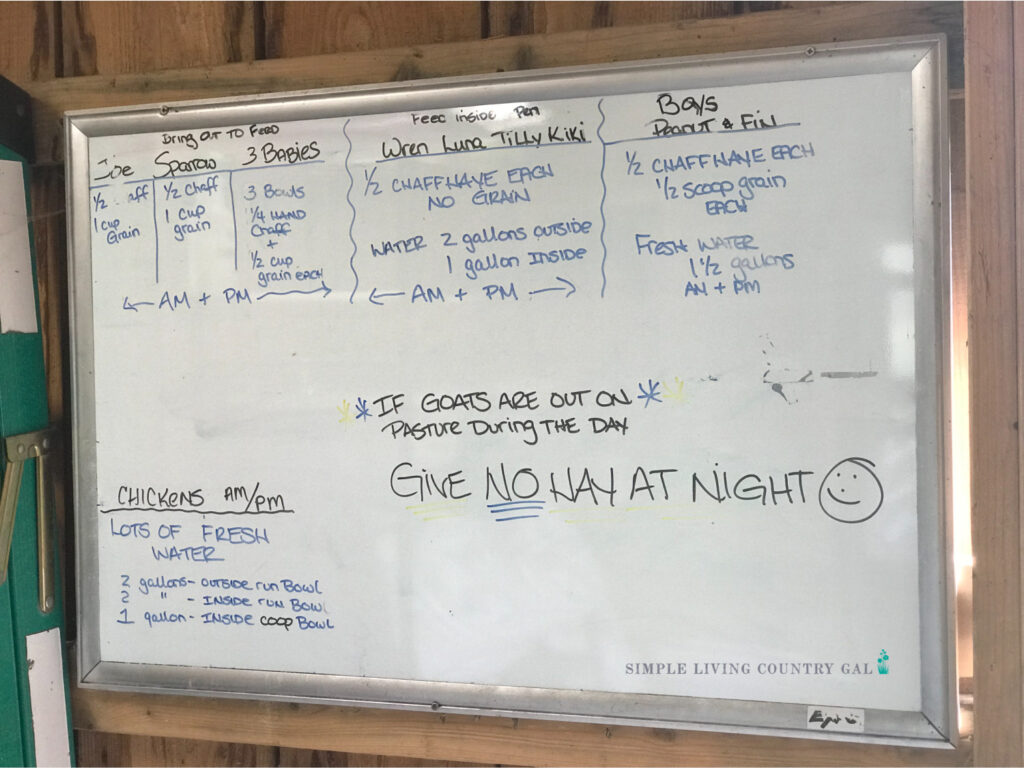
Step #6. Expect an adjustment period
As with anything new, there is always going to be a period of adjustment and nowhere is this truer than with our animals. My goats will act timid when my Hubby is out in the barn at chore time. This is because he is not usually out there when I am feeding.
Anything different, new, or out of the ordinary will make any animals stop and take notice.
Give your help a few days or even weeks to settle in before critiquing how things are working out. This should be enough time for them, you, and your animals to adjust to the new set of hands.
Step #7. To pay or not to pay
This part is definitely something you will need to iron out before getting started. Let your help know what days you need help, how long it should take them, and how you will compensate them for their help.
This includes the amount you will pay and the frequency. You will also want to discuss holidays and if they will be needed to work on those days. I have found that splitting up holidays between you and your help is a great way to keep things fair with everyone.
Bonus Tip
Be sure you have everything labeled clearly in your feed room. This will keep things so much more organized for your help and yourself. Labels are your friend and will help make chores easier for any help you hire.
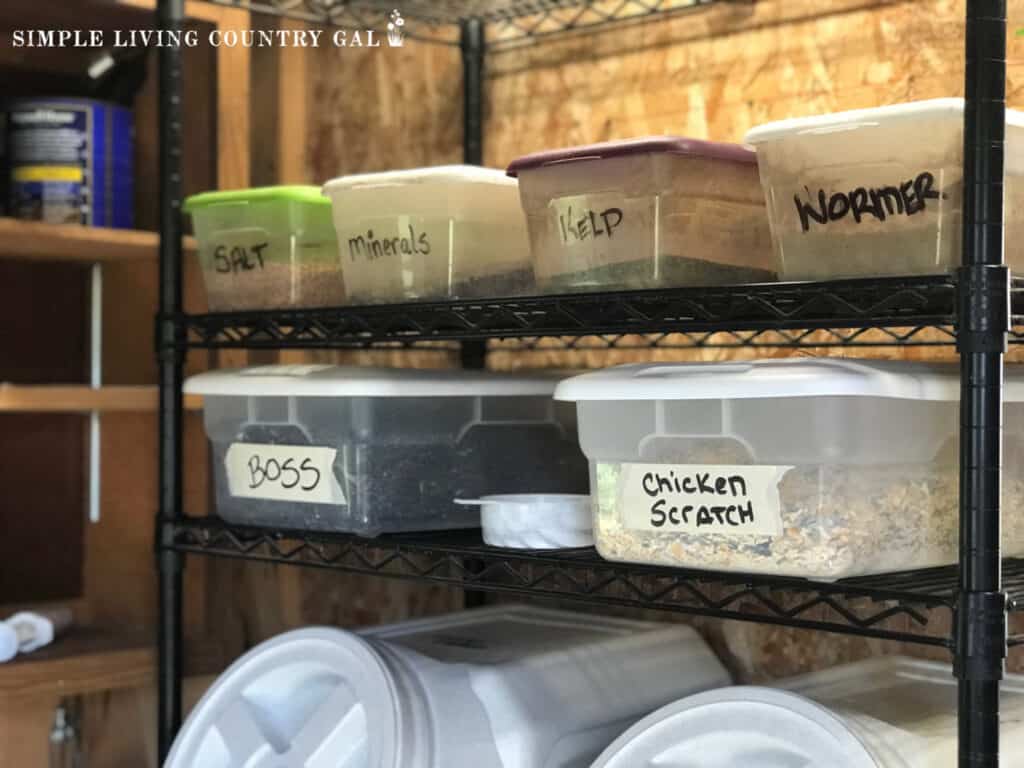
Luckily the reality of how to hire help for your homestead does not have to be all or nothing. We can have our farm-fresh eggs and eat them too!
Hiring help is easy when you stick to this quick list. Be clear on what you need, specific on the routine you need help with, and give a walkthrough so there is no confusion. This will ensure your help feels confident taking care of things and you feel comfortable taking time away.
If you love to travel and want the best of both worlds, then bringing in help might be a good solution. Use this guide on how to vacation when you farm so you can take a break and recharge.








This is the problem I’m having, thank you
We’re not homesteading yet, as we’re still in an HOA rental with no land. But while we’re still on the journey toward our new home and acreage, we’ve been in the helper role for almost 2 years, when my sister & her family want/need to be gone for a long day, weekend or more. My 9yo daughter and I enjoy spending time caring for their hens when asked, whatever the season. My sister thanks us with plenty of eggs and also full reign over food gardens that I’ve expanded the past 2 (too-short!) growing seasons (here in Minnesota). We’ll be moving 2 or 3 states south of here–hopefully sooner than later!–to homestead ourselves. in the meantime, I do what I can where I can up here, and I enjoy learning whatever I can in advance of our relocation. Thank you for your site and all of your info!
Your sister is blessed to have you and your daughter! Yes, your growing seasons are short, probably more so than ours (Pennsylvania). Have you thought about indoor gardening? Or back porch gardening? Maybe that is something you can do where you live?
All the best,
Tracy Lynn